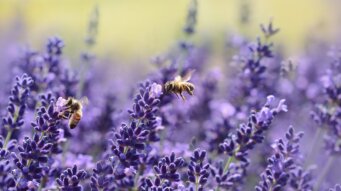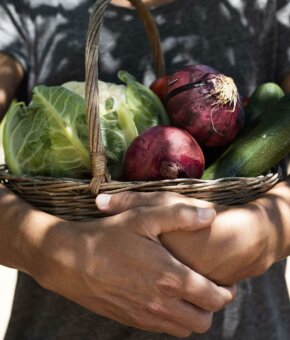
The Netherlands is full of green deserts. By sowing herbs and flowers on farmlands, tea company Wilder Land is tackling the biodiversity crisis.
Most sustainable companies are not per se beneficial for the Earth. By reducing their waste, using responsible resources or choosing green energy, they simply inflict less damage on the planet. To truly make a positive ecological impact, purpose entrepreneurs Daan van Diepen and Matthijs Westerwoudt have adopted a completely different approach. With every cup you drink of Wilder Land – their regenerative and local Dutch herbal tea brand – you are actively restoring nature and biodiversity in the Netherlands.
Green deserts
When it comes down to biodiversity in Europe, the Netherlands dangles at the bottom of the list. “Most people associate landscape degradation with the rapid desertification in Spain”, Daan says. “But over 25 percent of the Dutch land area consists of monocultures of grass. Because of these green deserts, we are confronted with serious ecological challenges.”
No life without insects
The lack of biodiversity makes it almost impossible for insects to find food. This does not only compromise the vitality of natural ecosystems, but it also endangers our own food production. Daan: “Insects are the pollinators of our crops. Without bees, we simply cannot grow things like tomatoes or eggplants. Therefore, to survive, the human species directly depends on biodiversity.”
Boosting biodiversity
By sowing strips of native flowers and herbs on the lands of farmers, Wilder Land creates more living space for insects, restores degraded soil and reintroduces nature to farms. “The great thing is that the impact of the strips already becomes visible in the first year”, Daan says. “Within a few months after sowing, the bees, butterflies, rabbits and birds return to their homelands.”
We would like to become the new Pickwick as soon as possible.
In addition to benefiting nature, the ecological progress Wilder Land creates also fills Dutch farmers with purpose and inspiration. “Many farmers would like to farm more nature-inclusively, but don’t know where to start”, Daan explains. “The strips are an accessible first step that motivate them to do more.”
Bigger difference
To increase their positive impact, over the next few years Wilder Land wants to grow substantially. “At the moment, we are not able to produce all of our tea ourselves, which is why part of our product comes from France and Germany”, Daan says. “By selling more tea, we can sow more flowers and herbs, which will enable us to become 100 percent Dutch within the next two years. And of course, we would like to become the new Pickwick as soon as possible.”
What cities can learn from Wilder Land
According to Daan, nothing is more fulfilling than restoring ecosystems whilst working together with nature. “There are three billion years of knowledge enclosed in nature about how we can best do things. If you turn those principles into a business model, you can make a real difference. Besides, working this way makes you incredibly happy. It is something I would like to continue to do for the rest of my life.”
Find empty urban spaces and turn them into lush oases full of native flowers and herbs.
Whilst Wilder Land mainly focuses on regreening the Dutch countryside and inspiring farmers to become more nature-inclusive, when it comes down to urban food production, cities can adopt a similar approach. Find empty urban spaces such as old car parks, rooftops and barren fields and turn them into lush oases full of native flowers and herbs, to create unique urban tea blends. This will not only boost urban biodiversity, but will also stimulate social cohesion and the local economy.
Ready for more stories about the green revolution in cities? Subscribe to our monthly newsletter. Inspiration guaranteed.
We’ve created this story together with MaatschapWij and BrightVibes: two kick-ass inspiration platforms.



